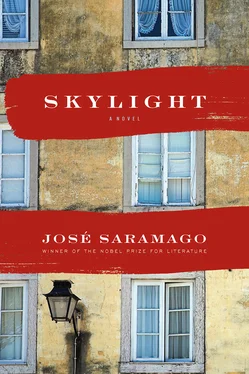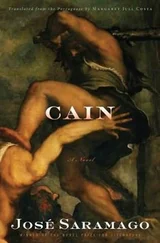Paulino was drawing on his cigarillo and looking at the girl. Lídia chipped in:
“Listen, darling, I’d really like it if you could find Claudinha a job, but if it’s just not possible… Claudinha’s a bright girl. She’ll understand.”
Maria Cláudia no longer had strength enough to fight back. All she wanted was to be out of there as quickly as possible. She made as if to get up.
“No, wait,” said Paulino. “I’m going to give you a chance. My current shorthand-typist is getting married in three months’ time and then she’s going to leave. You can come and work at my company and, during those three months, I’ll pay you the same as you’re being paid now, but meanwhile I want you to learn shorthand. Then we’ll see. If you do well, I can promise you that your salary will go up by leaps and bounds! Agreed?”
“Oh, yes, Senhor Morais. Thank you so much!” Maria Cláudia’s face was like a spring dawn.
“Don’t you think you should speak to your parents first?”
“No, there’s no need, Senhor Morais. They’re sure to say yes.”
She said this with such certainty that Paulino eyed her with some curiosity. At the same moment, Lídia remarked:
“And if at the end of those three months you’re not satisfied with her or she isn’t good enough at shorthand, you’ll have to dismiss her, won’t you?”
Maria Cláudia fixed Paulino with anxious eyes.
“Well, I don’t know if it will come to that…”
“Then you’ll be the loser…”
“I’ll learn, Senhor Morais,” Maria Cláudia said, breaking in. “And I do very much hope you will be satisfied with me…”
“So do I,” said Paulino, smiling.
“When should I start?”
“Well, the sooner the better. When can you leave your present job?”
“Now if you want.”
Paulino thought for a moment, then said:
“It’s the twenty-sixth now. How about the first of the month? Would that be possible?”
“Yes, sir.”
“Good. But wait, I won’t be in Lisbon that day. It doesn’t matter, though. I’ll write you a note to give to the office manager, just in case I forget to warn him beforehand. Not that I will, of course, but…”
He took a business card out of his wallet. He looked for his glasses, but failed to find them.
“Where did I leave my glasses?”
“They’re in the bedroom,” answered Lídia.
“Go and fetch them for me, will you?”
Lídia left the room. Paulino, still holding his wallet, was gazing distractedly at Maria Cláudia. She had been sitting with eyes lowered, but then she raised her head and looked straight at him. There was something in his gaze that she understood at once. Neither of them looked away. Maria Cláudia took a deep breath, making her chest swell. Paulino felt the muscles in his back slowly stretch. From the corridor came the sound of Lídia’s returning footsteps.
When she entered the room, Paulino was studiously rummaging around in his wallet, and Maria Cláudia was staring down at the carpet.
Lying in bed, his feet resting on a newspaper so as not to dirty the bedspread, Abel was enjoying a cigarette. He had eaten well. Mariana was a good cook and an excellent housewife. You could see this in the way the apartment was furnished, in the small details. His room was further proof. The furniture was poor but clean and had a dignified air about it. There is no doubt that just as pets — well, cats and dogs at least — reflect the temperament and character of their owners, the furniture and even the most insignificant household objects reflect something of the lives of their owners too. They give off coldness or warmth, friendliness or reserve. They are witnesses constantly recounting, in a silent language, what they have seen and what they know. The difficulty lies in finding the best, most private moment, the most propitious light, in which to hear their confession.
Following the seductive movement of the smoke as it rose into the air, Abel was listening to the stories being told to him by the chest of drawers and the table, by the chairs and the mirror, as well as by the curtains. They were not stories with a beginning, a middle and an end, but a gentle flow of images, the language of shapes and colors that leave behind them an impression of peace and serenity.
Doubtless Abel’s satisfied stomach had an important part to play in that feeling of plenitude. He had spent many months deprived of simple homey fare, of the particular taste food has when prepared by the hands and palate of a contented housewife. He had grown used to eating whatever insipid dish of the day cheap restaurants served up and the kind of fried fish that, in exchange for a few escudos, gives those with little money the illusion that they have eaten. Perhaps Mariana suspected as much; how else to explain her invitation to join them in a meal when they had only known each other such a short time? Or perhaps Silvestre and Mariana were different, different from all the other people he had met so far. Simpler, more human and more open. What was it that gave to the poverty of his hosts the ring of pure gold? (This, by some obscure association of ideas, was how Abel experienced the atmosphere in their apartment.) “Happiness? That doesn’t seem enough. Happiness is like a snail; it withdraws into its shell when you touch it.” But if it wasn’t happiness, what was it then? “Understanding, perhaps, but understanding is just a word. No one can understand another person unless he is that other person. And no one can be simultaneously himself and someone else.”
The smoke continued to drift up from his forgotten cigarette. “Is it simply in the nature of certain people, that capacity to give off some life-transforming energy? Something… something that could be everything or almost nothing. But what is it? That’s the question. So let’s ask that question.”
Abel thought and thought again, but only came up with more questions. He was stuck, at a dead end. “What kind of people are they? What is that capacity of theirs? In what way do they transform life? Are those even the right words to describe it? Does the mere need to use words make it impossible to find an answer? But then how do we find the answer?”
Oblivious to Abel’s speculative efforts, his cigarette had burned down as far as the fingers holding it. Taking great care not to drop the long piece of ash, he stubbed the cigarette out in the ashtray. He was about to pick up the thread of his reasoning again when he heard two light taps at the door. He got to his feet:
“Come in.”
Mariana appeared, carrying a shirt:
“I’m sorry to bother you, Senhor Abel, but I’m not sure if this shirt can be mended…”
Abel took the shirt from her, looked at it and smiled:
“What do you think, Senhora Mariana?”
She smiled too and said:
“I’m not sure. It’s certainly seen better days…”
“Do what you can, then. You know, sometimes I have more need of an old shirt than I do of a new one. Does that seem odd to you?”
“I’m sure you have your reasons, Senhor Abel.” And she turned the shirt this way and that as if trying to make it clear to him how very decrepit it was. Then she said: “My Silvestre had a shirt a bit like this. I think I still have some scraps, enough at least for the collar…”
“That’s an awful lot of work, do you think perhaps…”
He stopped. He saw in Mariana’s eyes how sad it would make her if he did not allow her to mend his shirt:
“Thank you, Senhora Mariana. I’m sure you can save it.”
Mariana left the room. She was so fat as to be comical, so kind as to make one weep.
“It’s kindness,” thought Abel, “but that doesn’t seem enough either. There’s something here that eludes me. I can see that they’re happy. They’re very understanding and kind, I can see that too, but there’s something I can’t put my finger on, possibly the most important thing, which might be the cause of that happiness, understanding and kindness. Or perhaps — yes, that’s it — perhaps it’s simultaneously the cause and the consequence of that kindness, understanding and happiness.”
Читать дальше












